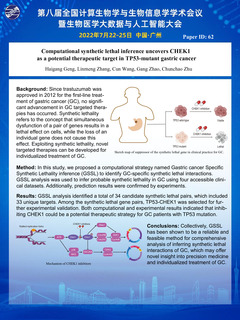Computational synthetic lethal inference uncovers CHEK1 as a potential therapeutic target in TP53-mutant gastric cancer
编号:62
稿件编号:4 访问权限:仅限参会人
更新:2022-07-02 20:04:20
浏览:1314次
张贴报告

报告开始:2022年07月23日 11:20 (Asia/Shanghai)
报告时间:20min
所在会议:[E] 张贴报告 » [E] 张贴报告
摘要
Background: Since trastuzumab was approved in 2012 for the first-line treatment of gastric cancer (GC), no significant advancement in GC targeted therapies has occurred. Synthetic lethality refers to the concept that simultaneous dysfunction of a pair of genes results in a lethal effect on cells, while the loss of an individual gene does not cause this effect. Exploiting synthetic lethality, novel targeted therapies can be developed for individualized treatment of GC. Method: In this study, we proposed a computational strategy named Gastric cancer Specific Synthetic Lethality inference (GSSL) to identify GC-specific synthetic lethal interactions. GSSL analysis was used to infer probable synthetic lethality in GC using four accessible clinical datasets. Additionally, prediction results were confirmed by experiments. Results: GSSL analysis identified a total of 34 candidate synthetic lethal pairs, which included 33 unique targets. Among the synthetic lethal gene pairs, TP53-CHEK1 was selected for further experimental validation. Both computational and experimental results indicated that inhibiting CHEK1 could be a potential therapeutic strategy for GC patients with TP53 mutation. Conclusions: Collectively, GSSL has been shown to be a reliable and feasible method for comprehensive analysis of inferring synthetic lethal interactions of GC, which may offer novel insight into precision medicine and individualized treatment of GC.
关键字
Gastric cancer;Synthetic lethality;Targeted therapeutics;TP53;CHEK1
报告人

发表评论